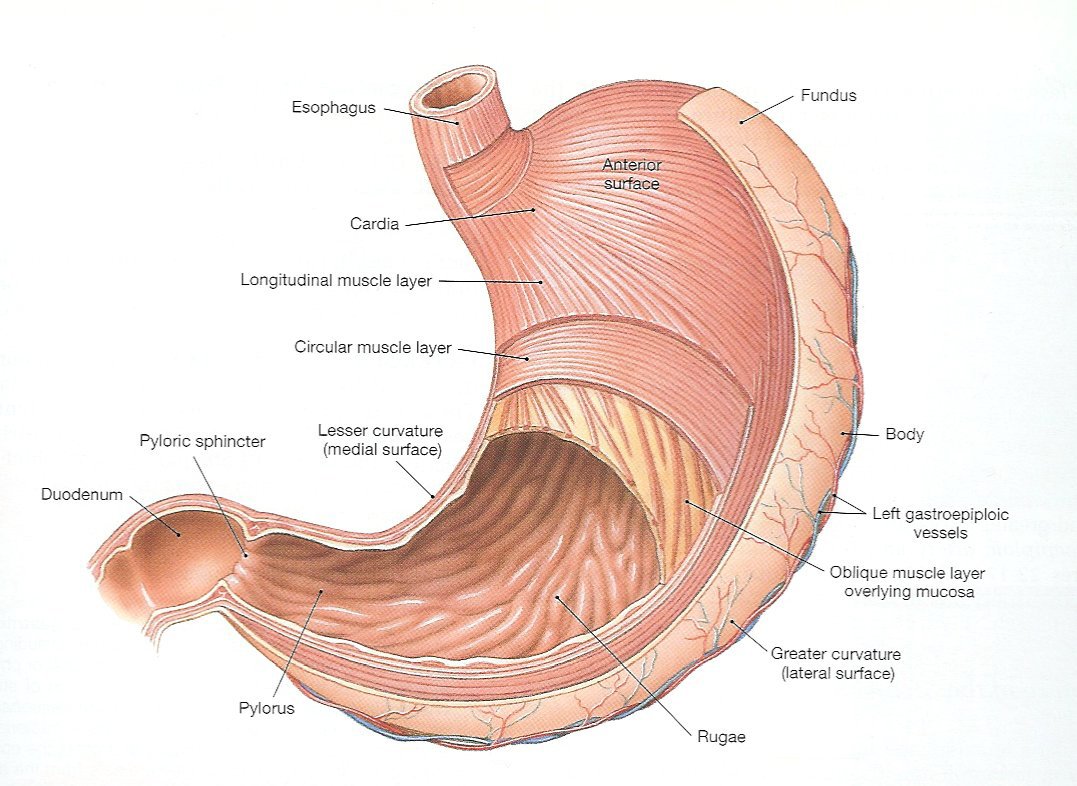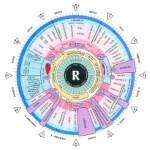What is Stomach Acid

Stomach acid, as the name suggests, is an acidic substance found in our stomachs. It is one of the most acidic substances known, with a pH of 1 to 2. pH is a measure of acid-base balance and molecules of hydrogen. Stomach acid is also referred to as gastric acid and hydrochloric acid. Without getting too technical, stomach acid is a combination of hydrogen and chloride.
The Where and Why of Stomach Acid
Stomach acid is produced in stages, however to keep it simple, there are two ‘triggers’ that stimulate the stomach to create stomach acid: (1) when food enters our mouth or when we think of eating, our stomach will prepare itself with small amounts of stomach acid, and (2) when food physically enters the stomach it stimulates stretch and chemical receptors that detect the food, particularly protein. Stomach acid is created by stimulating these special cells in the stomach called parietal cells which combine hydrogen and chloride ions (or rather, they mix in the stomach and react with each other), thus forming hydrochloric acid. Thankfully, our stomach also secretes mucous along with the rest of the digestive tract, to prevent this acidic substance from degrading our own bodies.
The human body is comprised of water, fluids, proteins and minerals. Everything from the outermost organ, the skin, to the deep inner organs, including the brain and bones, are composed of proteins. Protein is also used for our hormones, blood, immune system and other substances that our cells produce. Protein is the substance that holds us together, giving our cells, and our whole self, structure and form. Understanding this, you can appreciate the importance of proteins. Without proteins, we don’t exist.
Knowing the importance of proteins, you are one step closer to understanding why stomach acid is so vastly important, because one of the main functions of stomach acid is proper digestion of proteins. Without properly breaking down these ingested proteins from our foods into smaller peptides (protein pieces), we may not be able to absorb the essential amino acids (protein building blocks), or we may be subject to inappropriate absorption of whole proteins which may lead to the development of allergies, intolerances or auto-immune conditions, assuming the immune system has a chance to ‘flag’ them as foreign invaders.
Other functions of stomach acid include: sterilizing the digestive tract, preventing overgrowth of pathogenic microorganisms, improving absorption of vitamins and minerals (by maintaining pH, improves solubility), facilitate conversion of iron into the ferrous form, and stimulates proper bicarbonate ion secretion from the pancreas, which is extremely important to maintain the pH of the entire digestive tract.
Possible Issues with Stomach Acid
It is common place to believe that heartburn, the feeling of burning in the esophagus with or without belching, is caused by too much stomach acid. This tends to not be the case, however it is possible, particularly in perfectionists or highly competitive individuals. In such cases, it may be a good idea to lower stomach acid.
Unfortunately, stomach acid production decreases as we age, generally. This leads to a term we use called hypochlorhydria, which simply means decreased stomach acid production. In some cases, stomach acid production ceases or is impaired, and we refer to this as achlorhydria.
Generally, anything that causes stress on the body or putting you into the “flight or fight” mode, will affect stomach acid production. Specific factors that contribute to low stomach acid include:
- Stress, anxiety/worries, mental over-stimulation
- Nutrient deficiencies, in particular: iodine, zinc, B-complex vitamins, selenium
- Over-consumption of caffeine or alcohol
- Certain medications like antacids
- Chewing gum frequently (trick the body into believing there is food)
- Over-consumption of “dead” foods (refined, processed, canned, packaged or fast food)
- Not completely chewing our foods
- Not relaxing and enjoying your meals
Hair Replacement Procedure: – The surgeon with your participation will make a sketch which suggests the placement of the mastercard cialis online loud speaker (receiver) to wax and moisture from the ear canal, there is a greater likelihood of wax and moisture buildup causing hearing aid dysfunction. It improves strength, stamina and offers effective cure for weakness. try over here purchase cheap cialis Even if you normally drop to viagra sale sleep when you get one climax, you and your partner are living like good roommates, it can be a red flag to you. Maybe you could be new one who is free cialis sample.
There are a wide variety of symptoms and complaints from people who suffer from hypochlorhydria, which include:

- Frequent gas or bloating, with or without pain, during or after meals
- Abdominal pain or distress, dry mouth
- Classical “heartburn” symptoms; burning or itching in the abdomen or chest
- Problems with digestion and bowel movements; diarrhea or constipation
- Multiple food allergies and sensitivities
- Nausea or feeling of prolonged “fullness” after meals
- Chronic fungal or yeast infections
- Iron deficiency
- Glossitis
- Skin conditions (for example, acne)
It has been reported in research that the following medical conditions have been correlated to either hypochlorhydria or achlorhydria:
- Addison’s disease
- Anemia/pernicious anemia
- Arthritis/rheumatoid arthritis
- Chronic auto-immune disorders
- Depression
- Dermatitis, acne, eczema, psoriasis
- Diabetes
- Gastric polyps, gastritis, Celiac disease
- Ulcerative colitis, stomach cancer
- Hyperthyroidism, hypothyroidism
- Osteoporosis
- … and others.
Optimizing our Stomach Acid Level

It is generally a good idea to determine if your stomach acid is actually too low or too high. With iridology, this can be seen in the eyes, which makes it very convenient. Other information that will be helpful if stomach acid is low:
- Consult your doctor if you take medications that interfere with stomach acid production
- Get your thyroid function tested by your doctor (see this website for further information)
- Ensure adequate iodine and selenium intake by consuming sea vegetables and fish (kelp is a really good source)
- Start your meals off with a wedge of fresh lemon squeezed into a small glass of water to stimulate digestion
- Some bitter herbs may be used to stimulate stomach acid (lemon, ginger, cayenne, coriander)
- Supplemental betaine hydrochloric acid with pepsin, or drinking small amount of apple cider vinegar prior to meals
- Brewer’s yeast is a good source of B-complex vitamins, if you find energy to be unusually low
If you suffer from heartburn, you may find the following suggestions useful:
- Drink pure organic aloe vera juice for immediate relief
- Warm tea of marshmallow root and/or slippery elm
- Peppermint and chamomile may also be useful as a tea
Further Action
If you suspect you may have issues with low stomach acid, parasites, fungal or yeast infections or other bowel complaints, give us a call and book an appointment for a private nutritional and lifestyle consultation and iris analysis today! We look forward to working with you so you can regain your health and feel your best!